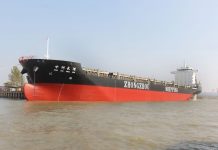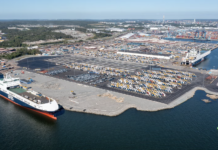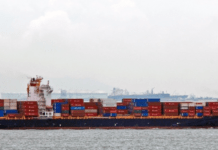
Τaiwanese shipbuilder CSBC Corporation ended its near drought of merchant ship orders on 12 August, when compatriot liner operator Wan Hai Lines commissioned a dozen 8,000 TEU methanol dual-fuelled container ships.
The total contract value ranges from US$1.23 billion to US$1.98 billion, representing CSBC’s largest order in its 51-year history. The contract also comes with options for another four ships. The firm vessel orders are expected to be delivered between 2027 and 2030.
Disadvantaged against its larger competitors in China, South Korea and Japan, CSBC Corporation, in which the Taiwanese state has a minor stake, has been struggling to win orders for merchant ships.
Its last real merchant ship order was a semi-submersible heavy load carrier delivered in October 2021.
In part to keep its yard busy and to capitalize on the Covid-19-induced boom in 2021, CSBC began building four 3,000 TEU container ships speculatively that year. Those ships were eventually sold to Wan Hai for around US$220 million in August 2022. Prior to that, the last boxships delivered by CSBC were a series of ten 2,800 TEU vessels ordered by Yang Ming Marine Transport, another Taiwanese liner operator.
The Taiwanese government and other local research institutions have helped keep CSBC’s yards in Keelung and Kaohsiung busy by ordering naval ships and research vessels. Currently, the only other merchant ship order in CSBC’s books is a 50,000 dwt products tanker commissioned by compatriot oil refiner CPC Corp.
In hopes of winning orders for container ships powered by alternative energy, CSBC embarked on research into ship designs powered by methanol and ammonia, working with classification societies Det Norske Veritas and Lloyd’s Register.
CSBC’s management said that the ship builder is now in talks with another liner operator that is also keen to commission methanol dual-fuelled 8,000 TEU ships.
Besides the vessels booked at CSBC, Wan Hai also ordered four 8,700 TEU methanol dual-fuelled ships at South Korean shipyard HD Hyundai Samho on the same day, for US$454 million to US$521.64 million.
Martina Li
Asia Correspondent








